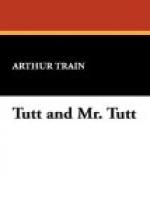“In which case he will—or shall—have been there—whatever the verb is,” agreed Tutt. “Anyhow they’ll tax every laundry and chop-suey palace from the Bronx to the Battery to pay us.”
“I’d hate to take our fee in bird’s-nest soup, shark’s fin, bamboo-shoots salad and ya ko main,” mused Mr. Tutt.
“Or in ivory chopsticks, oolong tea, imitation jade, litchi nuts and preserved leeches!” groaned Tutt. “Be sure and get the thousand down; it may be all the cash we’ll ever see!”
Promptly at twelve the law committee of the Hip Leong Tong returned to the office of Tutt & Tutt. With them came a venerable Chinaman in native costume, his wrinkled face as inscrutable as that of a snapping turtle. The others took chairs, but this high dignitary preferred to sit upon his heels on the floor, creating something of the impression of an ancient slant-eyed Buddha.
Wong Get translated for his benefit the arrangement proposed by Mr. Tutt, after which there was a long pause while His Eminence remained immovable, without even the flicker of an eyelid. Then he delivered himself in an interminable series of gargles and gurgles, supplemented by a few cough-like hisses, while Wong Get translated with rapid dexterity, running verbally in and out among his words like a carriage dog between the wheels of a vehicle.
It was, declared Buddha, an affair of great moment touching upon and appertaining to the private honor of the Duck, the Wong, the Fong, the Long, the Sui and various other families, both in America and China. The life of one of their members was at stake. Their face required that the proceedings should be as dignified as possible. The price named by Mr. Tutt was quite inadequate.
Mr. Tutt, repressing a smile, passed a box of stogies. What amount, he inquired through Wong Get, would satisfy the face of the Duck family? A somewhat lengthy discussion ensued. Then Buddha rendered his decision.
The honor of the Ducks, Longs and Fongs would not be satisfied unless Mr. Tutt received five thousand dollars down, five more if Mock Hen was convicted, three more if he died before the conclusion of the trial, and twenty thousand if he was acquitted.
Mr. Tutt, assuming an equal impassivity, pondered upon the matter for about an inch of stogy and then informed the committee that the terms were eminently satisfactory. Buddha thereupon removed from the folds of his tunic a gigantic roll of soiled bills of all denominations and carefully counting out five thousand dollars placed it upon the table.
“H’m!” remarked Tutt when he learned of the proceeding. “His face is our fortune!”
* * * * *
“Look here,” expostulated District Attorney Peckham in his office to Mr. Tutt a month later. “What’s the use of our both wasting a couple of weeks trying a Chinaman who is bound to be convicted? Your time’s too valuable for that sort of thing, and so is mine. We’ve got three white witnesses that saw him do it, and a couple of dozen Chinks besides. He doesn’t stand a chance; but just because he is a Chink, and to get the case out of the way, I’ll let you plead him to murder in the second degree. What do you say?”




